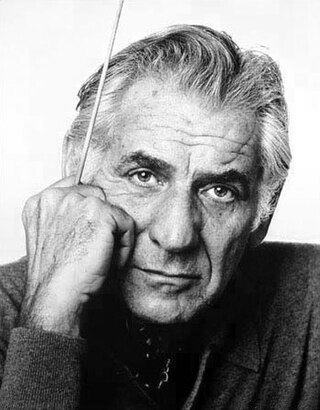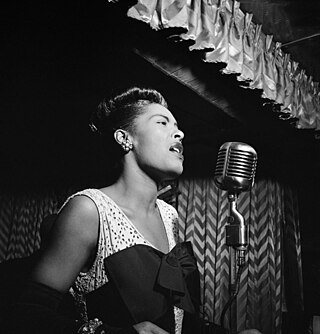Related Research Articles

Music is generally defined as the art of arranging sound to create some combination of form, harmony, melody, rhythm, or otherwise expressive content. Definitions of music vary depending on culture, though it is an aspect of all human societies and a cultural universal. While scholars agree that music is defined by a few specific elements, there is no consensus on their precise definitions. The creation of music is commonly divided into musical composition, musical improvisation, and musical performance, though the topic itself extends into academic disciplines, criticism, philosophy, and psychology. Music may be performed or improvised using a vast range of instruments, including the human voice.

Leonard Bernstein was an American conductor, composer, pianist, music educator, author, and humanitarian. Considered to be one of the most important conductors of his time, he was the first American conductor to receive international acclaim. Bernstein was "one of the most prodigiously talented and successful musicians in American history" according to music critic Donal Henahan. Bernstein received numerous honors and accolades including seven Emmy Awards, two Tony Awards, and 16 Grammy Awards as well as an Academy Award nomination. He received the Kennedy Center Honor in 1981.

Musical composition can refer to an original piece or work of music, either vocal or instrumental, the structure of a musical piece or to the process of creating or writing a new piece of music. People who create new compositions are called composers. Composers of primarily songs are usually called songwriters; with songs, the person who writes lyrics for a song is the lyricist. In many cultures, including Western classical music, the act of composing typically includes the creation of music notation, such as a sheet music "score", which is then performed by the composer or by other musicians. In popular music and traditional music, songwriting may involve the creation of a basic outline of the song, called the lead sheet, which sets out the melody, lyrics and chord progression. In classical music, orchestration is typically done by the composer, but in musical theatre and in pop music, songwriters may hire an arranger to do the orchestration. In some cases, a pop or traditional songwriter may not use written notation at all and instead compose the song in their mind and then play, sing or record it from memory. In jazz and popular music, notable sound recordings by influential performers are given the weight that written or printed scores play in classical music.

David Eugene Tudor was an American pianist and composer of experimental music.

Broadcast Music, Inc. (BMI) is a performance rights organization in the United States. It collects blanket license fees from businesses that use music, entitling those businesses to play or sync any songs from BMI's repertoire of over 20.6 million musical works. On a quarterly basis, BMI distributes the money to songwriters, composers, and music publishers as royalties to those members whose works have been performed.

A composer is a person who writes music. The term is especially used to indicate composers of Western classical music, or those who are composers by occupation. Many composers are, or were, also skilled performers of music.

Howard Harold Hanson was an American composer, conductor, educator, music theorist, and champion of American classical music. As director for 40 years of the Eastman School of Music, he built a high-quality school and provided opportunities for commissioning and performing American music. In 1944, he won a Pulitzer Prize for his Symphony No. 4, and received numerous other awards including the George Foster Peabody Award for Outstanding Entertainment in Music in 1946.

Maureen Kathleen Stewart Forrester, was a Canadian operatic contralto.

The Elder Conservatorium of Music, also known as "The Con", is Australia's senior academy of music and is located in the centre of Adelaide, the capital of South Australia. It is named in honour of its benefactor, Sir Thomas Elder. Dating in its earliest form from 1883, it has a history in professional training for musical performance, musical composition, research in all fields of music, and music education. The Elder Conservatorium of Music and its forerunners have been parts of the University of Adelaide since the early 1880s.
Bang on a Can is a multi-faceted contemporary classical music organization based in New York City. It was founded in 1987 by three American composers who remain its artistic directors: Julia Wolfe, David Lang, and Michael Gordon. Called "the country's most important vehicle for contemporary music" by the San Francisco Chronicle, the organization focuses on the presentation of new concert music, and has presented hundreds of musical events worldwide.

Patrick Doyle is a Scottish composer and occasional actor best known for his film scores. During his 50-year career in film, television and theatre, he has composed the scores for over 60 feature films. A longtime collaborator of actor-director Kenneth Branagh, Doyle is known for his work on films such as Henry V, Sense and Sensibility, Hamlet, Carlito's Way, and Gosford Park, as well as Harry Potter and the Goblet of Fire, Rise of the Planet of the Apes, Thor, Brave, Cinderella,Murder on the Orient Express and Death on the Nile.

The Ensemble intercontemporain (EIC) is a French music ensemble, based in Paris, that is dedicated to contemporary music. Pierre Boulez founded the EIC in 1976 for this purpose.

Mu Phi Epsilon (ΜΦΕ) is a co-ed international professional music fraternity. It has over 75,000 members in 227 collegiate chapters and 113 alumni chapters in the US and abroad.

Elizabeth Brown Larsen is a contemporary American classical composer. Along with composer Stephen Paulus, she is a co-founder of the Minnesota Composers Forum, now the American Composers Forum.
Vox Novus is a New York City-based organization consisting of composers, musicians, and music enthusiasts which presents and supports new music. Vox Novus was founded by Robert Voisey to promote contemporary composers in 2000.
The International Alliance for Women in Music (IAWM) is an international membership organization of women and men dedicated to fostering and encouraging the activities of women in music, particularly in the areas of musical activity, such as composing, performing, and research, in which gender discrimination is a historic and ongoing concern. In the U.S. the organization operates as a 501(c)3 non-profit. The IAWM engages in efforts to increase the programming of music by female composers, to combat discrimination against female musicians, including as symphony orchestra members, and to include accounts of the contributions of women musicians in university music curricula and textbooks.

Gena Branscombe was a Canadian pianist, composer, music educator and choir conductor who lived and worked in the United States.

Women in music include women as composers, songwriters, instrumental performers, singers, conductors, music scholars, music educators, music critics/music journalists, and in other musical professions. Also, it describes music movements, events and genres related to women, women's issues, and feminism.

Roulette Intermedium is a performing arts and new music venue located in Brooklyn, New York City. Founded in 1978, it has been located in the neighborhoods of Tribeca and SoHo in Manhattan, and now resides in a renovated theater in downtown Brooklyn. Roulette is a nonprofit organization focusing on fostering experimental dance, new music, and performance.
Myra Brooks Turner was an American composer, music educator, and writer, who composed for television commercials as well as for musical theatre, piano, and voice.
References
- ↑ Minding Your Business 04/17/12 - New York Women Composers Part 1 , retrieved 13 October 2015
- ↑ Composers Voice Presents: New York Women Composers (PDF), 2013, retrieved 13 October 2015
- ↑ Burns, Kristine Helen (2002), Women and music in America since 1900: an encyclopedia, Volume 2, Greenwood Press, ISBN 9781573563093 , retrieved 14 October 2015
- ↑ New York Women Composers, Inc. , retrieved 15 May 2014
- ↑ The XX-Files: Great literature by women composers (PDF), 2013, retrieved 13 October 2015
- ↑ WOMEN in MUSIC RESEARCH GUIDE: A Checklist for Research, 2012, retrieved 13 October 2015
- ↑ Search International Women's Day Events by Country , retrieved 13 October 2015
- ↑ Jezic, Diane; Wood, Elizabeth (1988), Women Composers: The Lost Tradition Found, The Feminist Press, ISBN 9781558610743 , retrieved 13 October 2015
- ↑ Baron, John H. (2002), Chamber Music: A Research and Information Guide, Routledge, ISBN 9780415937368 , retrieved 13 October 2015
- ↑ Barco, Guy A. (1996), Checklist of Writings on American Music, 1640-1992, Volumes 1-2, Scarecrow Press, ISBN 9780810831339 , retrieved 13 October 2015
- ↑ Composers' Award, The Daily Gazette, 11 June 1994, retrieved 14 October 2015
- ↑ New York Women Composers, Inc., News , retrieved 13 October 2015